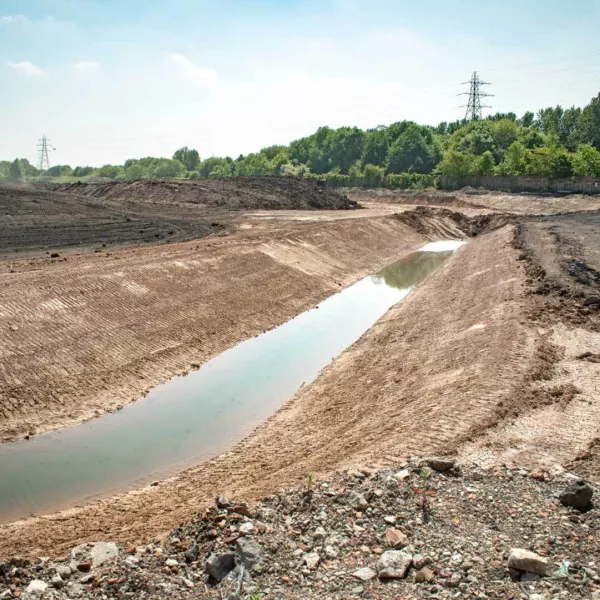Removing and destroying residual PFAS in groundwater
This chemical production site in Belgium, amid its frequent civil works, recently discovered PFAS in groundwater during a piping replacement project. Analysis revealed 4 micrograms per liter of PFAS, with 3.6 mcg being PFOS, a highly persistent molecule. Concerned about these harmful substances, the company enlisted DESOTEC for their expertise in purifying and destroying such persistent chemicals.
The Problem
This chemical production company frequently undertakes civil works at its busy site in Belgium.
One such project involved replacing piping that was a few metres underground, which necessitated the dry suction excavation of groundwater before digging.
This groundwater was found to contain 4 micrograms per litre of PFAS, of which 3.6 mcg was perfluorooctane sulfanate (PFOS): one of the best-known long-chain type of PFAS molecules that are especially persistent.
As the company discharges water to the nearby river, a very high level of purity is essential, which the company assesses via water quality tests. The legal limit was initially 500 nanograms of PFAS per litre, later reduced to just 100 ng/l following the regulation update from June 2023. PFOS limits were also reduced from 100 ng/l to 20 ng/l.
The company had encountered DESOTEC through a workshop we delivered on PFAS purification, and contacted us for help.


The Solution
To treat a flow rate of 6.5 m³/ h, we placed two 2m³ Mobicon 2000 filters in series.
This lead-lag configuration meant the client could always be sure the PFAS was being adsorbed, even during the two-week wait for lab results.
The client measured the water flow after it had passed through the first filter: once it was saturated, the PFAS would break through and be adsorbed by the second filter. Having two filters in series also extended the amount of contact time that the PFAS had with the carbon, ensuring maximum adsorption and providing the client with sufficient time to react in case of breaktrough. The first filter was then exchanged for a new one, which was placed behind the existing filter.
The filters were filled with our high-performance agglomerated carbon grade, ORGANOSORB 10AA, which is particularly suited to long-chained PFAS and PFOS.
The Results
The treated water remained compliant for PFAS and PFOS throughout the project, which continued for 2-3 months.
After completion, the client embarked on two further civil works projects for which it also used Mobicon 2000 filters. Some customers who have a rolling programme of civil works choose to keep these filters permanently on site, ready for the next project. However, DESOTEC supplies all filters on a rental basis, and can also remove or deliver them swiftly between projects, maximising flexibility.
A major advantage of DESOTEC’s service is that we don’t just shift PFAS and PFOS away from customers’ sites – we ensure they are completely destroyed.
After exchange, we transport the closed saturated filters away from the customer’s site to our own facilities. There, we analyse the spent carbon to determine the level of PFAS and PFOS it has adsorbed.
If PFAS levels are too high, we are not allowed to reactivate the carbon and must send it to an external specialised company for incineration. According to the EU POPs regulation, the limits are 50 ppm for PFOS, and 1 ppm for two other types of PFAS: perfluorooctanoic acid (PFOA) and perfluorohexanesulfonic acid (PFHxS).
For this customer, the analyses showed a PFAS concentration on the spent carbon below the POPs regulation limits, so we can guaranty that the waste coming from our clients will be treated in full compliance with the POPs regulation. The high temperature reactivation technology breaks down the PFAS completely and safely, thus avoiding their release in the environment.
The gases and impurities generated by this process, including the hydrogen fluoride which is formed during the PFAS destruction are neutralised via our flue gas treatment, making sure all contaminants are eliminated. No PFAS remains.
The reactivated carbon is completely free of pollutants and suitable for reuse. This circular approach drives down costs, is more sustainable and helps our customers meet their green goals.
Contact DESOTEC today
If you are one of the numerous companies who encounter any type of PFAS in their groundwater, help is at hand. Contact our team of engineers today to discuss how our sustainable mobile filtration solutions could work for you.
Contact our expertsContact DESOTEC today
If you are one of the numerous companies who encounter any type of PFAS in their groundwater, help is at hand. Contact our team of engineers today to discuss how our sustainable mobile filtration solutions could work for you.
Contact our experts-
Restricted Chemicals
Firms handling restricted chemicals need reliable solutions. Our filters treat POPs, PFAS, SVHC and CMR chemicals from air and water in a safe and sustainable manner. -
Remediation Services
Mobile, temporary, full-service purification solutions for air, soil, and groundwater, creating a cleaner world for future generations. -
Our unique service
Our closed-loop, full-service model is as unique as your business needs. We’ll define the right filtration setup and safely recycle filtration waste, making it easy to go green.


